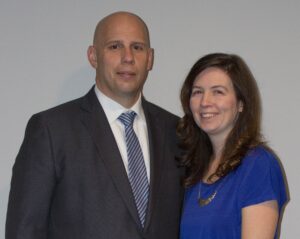by John Combest

A small white chapel sits nestled in Ngaliema Bay of Kinshasa, Congo. Few know of its existence. Yet, this unassuming brick edifice stands as a monument to those first missionaries who, despite all obstacles, brought Christ to this land. Dr. Aaron Sims, a Baptist missionary doctor, pioneered several of the mission stations along the Congo River, building this church alongside his own humble home in 1981. Two years later, his colleague, Fritz Gleichman, passed away suddenly and was interred a few meters from the sanctuary.
I have often looked out across the Ubangi River and wondered if there were still any missionaries serving on the other side. These two Congos, separated by a river of the same name and a tributary upon which I live, have buried many a diplomat, businessman, and missionary. Yet, over the past two centuries, the church of God has recognized its undying duty to push the frontiers of Christianity. We sent scores of missionaries into the interior to people unknown and places unnamed. Many a widow and widower buried their grief and loss and moved yet deeper into the endless expanse of Congo. Questions plague me – How far did they go? Is there still a frontier which the Gospel has not reached? Are there yet a people to whom Christ has not been preached?
For a number of years, I have begged the Lord to send us fellow missionaries who would share in the labors on this side of the river, freeing me to cross over into the northwestern regions of DRC. I have watched in grief as mission boards, agencies, and churches have steered young and old alike away from these beleaguered zones to the more developed and tender fields of west and east Africa. “Security and stability” they say! Do we think for a moment that those early missionaries did not face death and hardships at every turn? Do not the scores of gravesites across this region speak to this very point? Has the situation somehow worsened since Livingstone first penetrated these dark corridors of central Africa? How is it then that the young men of our generation are content to be children’s pastors and “ministry helpers” and our young women to be nursery workers? Where is the strength and youth of our generation? Where is the fortitude which so clearly marked the lives of those before? Those were the days when frontiers were smashed and ministries carved out of the forests through years of dogged determination and effort, despite the “insecurity and instability.” Today, in Kinshasa, a city of seventeen million, you find the remnants of this last generation of workers, all well beyond the age of retirement with illnesses which will see them to their graves; and yet, with no one coming, here they live, bearing the increasing load and care of all the churches. Who will come alongside the church to continue the work of Biblical and pastoral training, music, literacy, and Scripture distribution? Who will help develop and translate materials for the strengthening of the church? Who will organize and lead the faithful into a future of increasing opportunities? And above all, who will carry on that spirit of missions—eyes ever on the horizon, seeking out those places where the gospel has not yet reached and those people to whom Christ has not yet been preached?
Listening to these old missionaries speak cannot but leave you with a heavy heart. There is a general confusion and dismay at the fragility and timidity of our age. To these, who themselves have opened new trails and founded new works, there is great sadness at the loss of focus and drive which so defined the churches of their time. Where are the missionaries for the coming generation? Have we convinced ourselves that the work of missions has been completed? These elderly ministers would beg to differ. They would argue that the work has just begun! Not only are there groups yet without the gospel, but there exists a church and a Christian community to teach and disciple. But this is no fool’s game. The challenges both within and without the church are significant. Even as these missionaries sit in wonder, their tough personalities and continual stories show the difficulties which they have endured.
Yesterday evening, I came across a man from Spain who was motorbiking across the continent. For three hours, he spoke of his journey: kidnapped in Nigeria, held at gunpoint in Tunisia, chased by rebels on motorcycles in Mali, thrown in a jail in Benin. All this was “ok,” but Congo… Congo had broken him. He cried openly twice as he shared the difficulties he has faced here and of his near-death experience with malaria. So overjoyed was he at seeing us that he spent the night at the foot of my bed in a village in central Congo. This is a warning to those who would come in search of adventure – Congo has a way of tempering those notions.
That said, I plead for our youth, the strength of our nation, those who desire a work which demands their lives and absolute attention. I plead for our parents whose words and actions are so influential and upon whom God has placed the work of raising these future missionaries. I plead for our pastors who help guide our churches and have the opportunity to turn the hearts of our people back to the greatest of all commissions. The more I travel about this land [Congo], the greater the burden of ministry becomes. Our ministries and travels demand an ever-increasing investment from us both financially and physically, and yet, who else is there? And where else are we to turn for help if not to the very body to which this mission on Earth has been left? I can never forget that simple grave behind the small white chapel in Kinshasa, that symbol of a time and sacrifice past. Just like the greatest Sacrifice of all, may these sacrifices never be forgotten by the church. May their testimonies drive us ever forward until this work is complete and Christ returns for us.
Contact: johnforcongo@gmail.com








 Ten thousand Pame live in San Luis Potosi, a state of central Mexico. They call themselves Xiúi meaning “indigenous.” The Pame cultivate maize, beans, squash, and chili which constitute their main diet. However, the soil is poor and rocky and many Pame are migrant workers.
Ten thousand Pame live in San Luis Potosi, a state of central Mexico. They call themselves Xiúi meaning “indigenous.” The Pame cultivate maize, beans, squash, and chili which constitute their main diet. However, the soil is poor and rocky and many Pame are migrant workers.
 Before we learned the importance of pronouncing Thai with the proper tones, we would get into a taxi and tell the driver where we wanted to go. The drivers always did a double take and looked at us strangely. We later learned that instead of saying that our destination was Muang Ake, we were saying “knock on your head.” —Vicki
Before we learned the importance of pronouncing Thai with the proper tones, we would get into a taxi and tell the driver where we wanted to go. The drivers always did a double take and looked at us strangely. We later learned that instead of saying that our destination was Muang Ake, we were saying “knock on your head.” —Vicki Brother Johnny Leslie, missionary to Croatia, was preaching about John the Baptist having his head cut off. He should have said odrezati but instead said narezati. Both words mean “cut,” but the congregation roared with laughter because narezati is only used when talking about slicing something like salami!
Brother Johnny Leslie, missionary to Croatia, was preaching about John the Baptist having his head cut off. He should have said odrezati but instead said narezati. Both words mean “cut,” but the congregation roared with laughter because narezati is only used when talking about slicing something like salami!